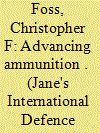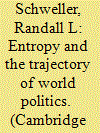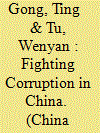|
|
|
Sort Order |
|
|
|
Items / Page
|
|
|
|
|
|
|
| Srl | Item |
| 1 |
ID:
143187


|
|
|
| 2 |
ID:
094560


|
|
|
|
|
| Publication |
2010.
|
| Summary/Abstract |
The random and indeterminate nature of the current unipolar world suggests a condition of increasing entropy. There are two reasons for this claim. First, relative capability advantages under unipolarity do not translate as easily as they once did into power and influence over others. Second, systemic constraint is a property that limits actors' freedom of action by imposing costs and benefits on certain kinds of actions. Unlike past multipolar and bipolar systems, the current unipolar system exerts only weak, if any, systemic constraints on the unipolar power and all other actors as well. Thus, polarity has become a largely meaningless concept. Today, system process rather than structure best explains international politics, and this process is one of entropy. Finally, I suggest two pathways from unipolarity to a more balanced system: one is fairly consistent with standard balance-of-power realism but adds an ideational component; the other restores equilibrium by means of entropy.
|
|
|
|
|
|
|
|
|
|
|
|
|
|
|
|
| 3 |
ID:
184997


|
|
|
|
|
| Summary/Abstract |
This article provides an overview of the decades-long fight against corruption in China, focusing on its trajectory, dynamics, and impact. Corruption has long been a threat to China’s social stability, its economic development, and even the legitimacy of the regime. Equally notable are the numerous efforts made by successive generations of the Chinese leadership to control and prevent corruption. While goals may have remained the same across different periods, anti-corruption strategies and methods have changed considerably, moving from sporadic campaigns to more institutionalized methods and from power-driven rectification to rule-based integrity management. The current anti-corruption drive, launched after Xi Jinping took power at the 18th National Party Congress in 2012, not only has demonstrated novel features, suggesting a multi-pronged approach, but also is unprecedented in its breadth, depth, and severity. What are the dynamics of China’s fight against corruption? Has the increasingly intense crack-down been able to contain corruption? How can we understand the impact and effectiveness of anti-corruption enforcement in China? The six articles, including this one, in this special issue provide answers to these questions.
|
|
|
|
|
|
|
|
|
|
|
|
|
|
|
|
| 4 |
ID:
183218


|
|
|
|
|
| Summary/Abstract |
This article aims to contribute to the critical understanding of how International Relations (IR) was built as a social science field within Brazil's modern project. I argue that the foundation and the development of IR in Brazil in the twentieth century is closely associated with foreign policy, on the one hand, and with the national geopolitical thinking, particularly in the aftermath of the Second World War, on the other. In its trajectory, Brazil's IR has been influenced, among others, by the analysis of domestic and systemic determinants of foreign policy, historical interpretations, the study of the components of state power, studies of diplomacy and its contribution to the country's development, the analysis of decision-making processes and to a lesser extent, cognitive approaches. This article is organised around three sections. First, I present a brief history of the geopolitical tradition in Brazil's IR. Second, I discuss IR development in Brazil, stressing the role of diplomats, the key contribution of intellectuals coming from social and human sciences, and finally the emergence of the first generations of IR scholars in the eighties. Third, I analyse the institutionalisation of the field, its quantitative and qualitative growth, presenting some data on its organisation in recent times.
|
|
|
|
|
|
|
|
|
|
|
|
|
|
|
|
|
|
|
|
|